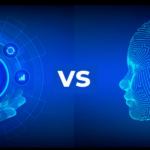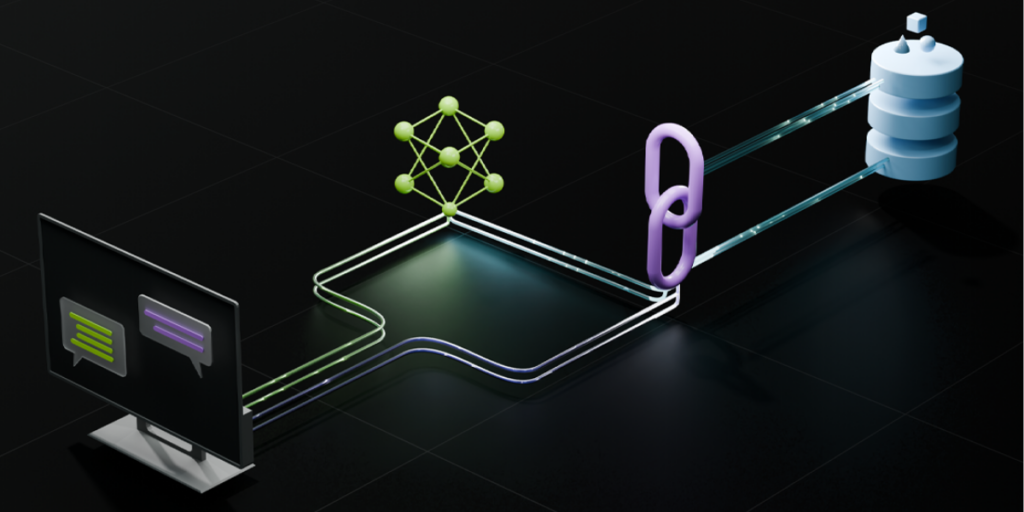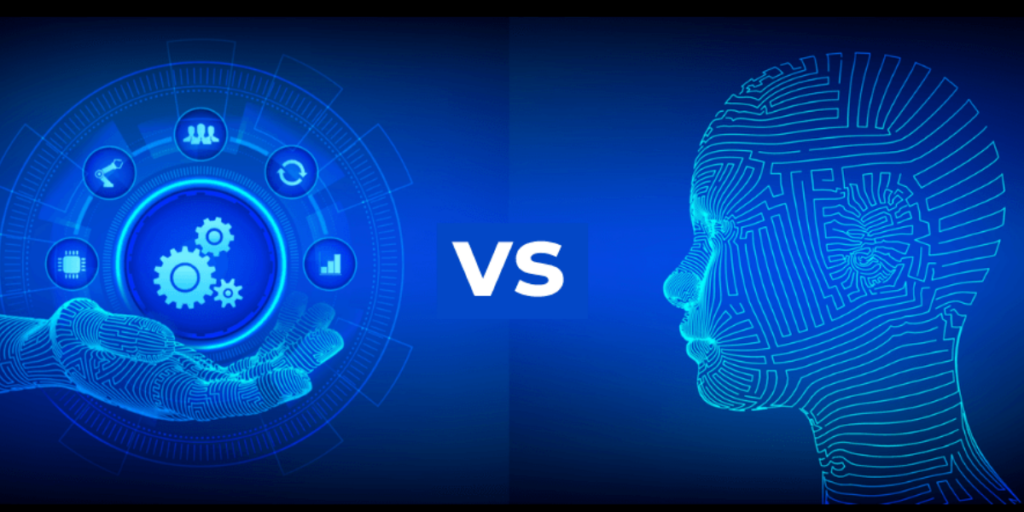To remain competitive and offer excellent customer experience, retail stores are shifting their focus to artificial intelligence (AI). AI technologies are changing how companies engage with customers, streamline processes, and improve security. It is tremendously reshaping our shopping experiences. There is no longer a time when customers wait in line for the person in customer service to attend to their request. Today, AI chatbots can literally resolve them any time, from anywhere, with just a few mouse clicks.
Additionally, users don’t have to hunt for their favorite items manually offline on the internet. All they have to do is simply click a photo of the product and then use AI’s search tool to see the exact item, along with comparable items. The realm of eCommerce has witnessed a dramatic increase in the last few years, and online sales are expected to reach approximately $8.1 trillion by the year 2026. The growth in this area is not just due to the increase in online shopping, but it is also due to the smart use of AI in the e-commerce marketplace.
In order for brands to distinguish themselves within this crowded marketplace, they must implement innovative technologies that grab the interest of prospective buyers and convert them into sales. A well-planned implementation of AI for eCommerce holds the potential to provide an instrument that will allow businesses to achieve a competitive advantage.
In this blog, we look at some of the most successful examples of AI for eCommerce.
So, let’s get started.
What Is AI-powered E-commerce?
Artificial Intelligence-powered e-commerce leverages AI to improve the customer experience and the efficiency of merchant business operations. Imagine a shopping assistant all day, every day. AI analyzes huge quantities of data in order to comprehend the behavior of customers, identify trends, and customize your shopping experiences.
AI algorithms are used to streamline processes within eCommerce firms, like the recommendation of products, and individualized marketing campaigns. This advancement in AI technology has allowed eCommerce companies to provide better service and generate more sales. Through increased efficiency, precision, and personalization, AI transforms how we conduct business on the internet.
Benefits Of AI In eCommerce
AI-powered tools provide a vast array of benefits for eCommerce companies of any size and type. The advantages of implementing AI in eCommerce are:
Personalized Customer Experience
Customers of today want goods and services that can be specifically tailored to their demands. So, organizations must be focused on personalization and adapting in order to provide a better experience. The use of personalised messages or one-on-one chats will help companies be noticed by clients.
AI chatbots and voice assistants are now advanced enough that they allow for deep personal communication through personalized content. The technology is able to understand the customer’s needs and replicate the natural-like voice of sales representatives. This technology also offers customers 24/7 support in all seasons across all time zones and different languages. Additionally, consumers who are familiar with AI assistants such as Alexa and Siri have become confident about shopping online using AI in the eCommerce space.
Remarketing To Potential Customers
Remarketing to eCommerce includes engaging with customers who have previously visited the website to inspire users to come back and perform an action they would like, such as purchasing a product or signing up for a particular service. Remarketing is a crucial approach to online marketing because the majority of potential buyers will spend time looking at an item or brand by browsing other websites or reading reviews from customers prior to making a purchase.
Thanks to AI for eCommerce, retailers are more able to detect and monitor customer purchase behavior based on the most bought products, reviews from customers, or items that are most frequently viewed. Data from these sources could be utilized later to design targeted strategies and content that will draw customers back to the shop.
Push notifications can be the most efficient way to retarget customers for this. The notifications are quick and simple, which means it’s unlikely that customers will be angry. The eCommerce company can also make use of customized push notifications, which offer one-on-one communications.
Business Workflow Automation
Stores selling online are required to be open 24/7 through different channels to offer customers with a seamless experience. The implementation of AI for eCommerce could aid in automating the processes of eCommerce companies by managing the repetitive work tasks efficiently and effectively, while also reducing costs. It can simplify the back-end and front-end processes.
AI-powered eCommerce could dramatically improve efficiency and effectiveness by automating repetitive processes. With advanced algorithms, AI can analyse huge quantities of customer information, which allows individual product recommendations, and customized marketing strategies. AI can help manage inventory through predicting patterns of demand as well as optimizing levels of stock as well as suggesting timings for reorders.
Customers can get their questions answered swiftly using AI-powered chatbots that are powered by AI improving the customer experience. In addition, AI solutions for retail and Ecommerce can streamline pricing strategies through analysis of price trends of competitors and customer behaviour in order to establish the best prices.
Optimized Time and Resources
In today’s highly competitive market of eCommerce, companies must maximize their time and money to be competitive in the marketplace. AI within eCommerce is a key function in optimizing time and resources through automation and enhancement of different processes across the eCommerce cycle.
AI-powered recommendation systems analyze customer shopping habits and browsing patterns to provide personalized suggestions for products, enhance the user experience, and boost sales. Chatbots driven by AI are able to handle customer inquiries, decreasing the demand for human resource resources while freeing the customer service team to tackle more difficult questions. In addition, demand forecasting using AI will analyze sales history, market trends and external influences to give exact forecasts that allow retailers to optimize their inventories and avoid shortages or situations of overstocked stock.
Understanding The Impact Of AI On eCommerce
AI technology can be utilized to accelerate and automate processes, drastically reducing cost and better handling the jobs that were previously handled by humans. This is why artificial intelligence has transformed several eCommerce firms.
Customer Interaction
The way that consumers interact with retail stores is influenced by AI, which has advanced technology that’s capable of having conversations with machine learning. The most popular tool is chatbots that communicate with customers and respond to questions with an array of responses that have been programmed. Although chatbots may not completely replace human customer service representatives, they can make it easier for customers to interact directly with humans.
AI voice recognition software increases customer interactions by dictation and listening. It also gives retailers the chance to speed up processes, improve user experience, and decrease the amount of time for a staff member to answer customers with an inquiry.
Data Analysis
AI is having a huge impact on the retail industry through analysis of data. AI algorithms are able to process voluminous data in a short time and with accuracy more quickly than humans. The primary benefit this brings for eCommerce is the ease of reports and forecasting of sales. By analyzing data, eCommerce firms can discover valuable information to improve the efficiency of their operations. Be it stock management and marketing budgets or extending to new markets, AI tools help inform strategic decisions.
General Operation
The application of AI for retail could assist in a variety of different business processes and operations, too. In the future this can include robots at warehouses to help to build, sort, and store items. Also, visual recognition tools help stop counterfeiting. Also, interactive pricing tools take into consideration the cost of manufacturing, prices from competitors, and demand for products and automatically adjust prices at a moment’s notice.
AI retail solutions is constantly evolving through the use of new technology that is continually being created, providing practical solutions to eCommerce. Retailers must evolve by keeping up with these changes and find solutions appropriate for their needs.
Creation Of Content
Whatever sector you work in or the kind of content you’re looking for help with, AI can assist you in writing content. Though clear, well-thought-out, and precise guidelines are required, human oversight is also essential to monitor the accuracy of AI-generated content. AI provides a quick and efficient solution to almost all needs related to content. One of the most sought-after ways that retailers utilize AI tools for content is by making SEO articles, product titles and descriptions, advertisement text, and organic social media content.
Types Of AI Technology In e-commerce
Let’s have a look at key AI technologies used in e-commerce.
Machine Learning (ML)
Machine learning allows self-learning using the data of AI commerce without the requirement to use more information. By using DL and LLMs algorithm, Ecommerce stores can better comprehend customer interactions and trends in sales, streamline logistical processes, and improve stock management. This results in an excellent experience for customers.
Natural Language Processing (NLP)
Utilizing NLP technologies, e-commerce can improve the chatbot’s ability to respond quickly to customer queries in a contextual manner. Quick and reliable responses provided 24 hours a day are a delight to clients. GPT is an extremely popular OpenAI model which benefits companies by offering unique features.
Data Mining
The businesses that operate on the internet generate huge amounts of data each day. When properly analyzed and collected this data can help to improve product quality that is offered. Data mining assists e-Commerce stores find data with the help of AI algorithms. This helps to make product suggestions based on the past behavior of sales.
Computer Vision (CV)
Computer vision permits e-commerce stores to increase customer search capabilities. For example, customers may take photos of the item they are interested in and then use the image to find the item in the Ecommerce store in a short time.
Top 16 Examples Of AI In eCommerce
In this section, we will look at some of the top examples of AI in eCommerce that are transforming the e-commerce landscape.
Personalized Suggestions
The very first instance of AI in the field of eCommerce we review is the personalization of recommendations. Recommendation engines make use of algorithms that analyze huge datasets, histories and patterns in customer behavior. Based on the information, retail stores can recommend appropriate products to customers that are tailored to the person.
It’s a smart method for businesses that sell on e-commerce to generate interest by anticipating the kind of products that a customer would be most interested in, and also improve cross-selling and upselling of items. This also aids in the discovery of products by showing items that might not have been noticed by consumers.
Enhancing Search Efficiency
How people search for things online has been totally changed by the rise of AI-powered search engines. These cutting-edge tools created a radical transformation in search engine discovery for products and exploring.
Utilizing the potential of AI on eCommerce sites and mobile apps, searches using the latest AI tools like Google Lens have not only increased and improved the overall shopping experience, but they have also opened the way to more effective and precise searches for products. AI algorithms analyze user behavior preferences, habits, and prior search results. They can provide extremely relevant results when used correctly within the eCommerce market.
Ranking Product Performance
AI algorithms can be used to closely examine the actions of the customers to make constant improvements to the rankings of the products. A good example is Amazon’s usage of AI technology. They make use of it to change their rankings for products by taking into account diverse aspects, including the quality of their product and feedback from customers. It ultimately results in higher levels of satisfaction with the product and an increase in sales.
AI-Powered Autosuggest
Utilizing artificial intelligence to develop tools and autosuggest features can greatly improve the experience for users. The advanced functions utilize algorithmic algorithms that anticipate questions and offer product suggestions at a moment’s notice when people search. Utilizing AI-powered autosuggest is not only a way to speed up the searching procedure but also inspires customers to investigate other choices, ultimately resulting in increased sales.
Product Descriptions
Generative AI is used in retail stores to create and enhance the description of products. For large e-commerce companies that offer a huge selection of items, AI can cut down on lots of energy and time invested in making product descriptions. Additionally, AI tools can do this well, creating unique product descriptions that incorporate specific product information and keywords to be relevant and distinct.
This is beneficial for retailers who have to improve their descriptions of their products for SEO, in order to promote feed-based ads or assist in making a purchase. There are many tools available on the market that automate the description of products including ChatGPT, Ahrefs and Copy.ai.
Optimized Product Pricing
The use of dynamic pricing allows businesses to improve their overall pricing strategies. If the brand is positioning itself in a way that will market itself lower than its rivals, AI algorithms can be utilized to continuously refine its pricing in order to give it a better competitive advantage.
This dynamic pricing algorithm driven by AI will seamlessly blend competitor price information, demand, and supply changes and automatically adjust pricing to maximize profit. Through full access to market information, AI tools can further predict the best time and amount of discounts by dynamically calculating the minimum discount needed to entice buyers to make a purchase.
Fraud Purchases Detection
AI plays a crucial role in the improvement of fraud detection for eCommerce firms by using advanced algorithms that examine vast quantities of transaction data and identify unusual patterns or irregularities at a moment’s notice. Machine learning methods help AI models learn from previous incidents of fraud and constantly adapt to the latest tactics used by criminals.
The models are able to detect suspicious purchases, odd patterns of payment, and other indications of fraudulent activity that are not noticed by the traditional rules-based system. By identifying frauds quickly, AI not only minimizes costs but also improves the trust of customers by providing an improved and safer online shopping environment.
Improved Social Media Listening
AI will enhance the business’s social listening through the extraction of valuable customer data from social media sites. With the use of advanced NLP algorithms, AI is able to sift through huge quantities of social media posts, which include posts, comments, and reviews, in order to gather a deep understanding of the preferences of customers, their sentiments, and other trends.
By analyzing patterns in language and emotional expressions and the mention of certain products and brands, AI will be able to discern new trends and help businesses more accurately gauge customers’ reactions to new marketing initiatives or product launches.
Image Recognition
AI retail software development can be utilized to study images submitted by users and to offer product suggestions with a similar appearance to the picture provided. One great illustration of this is the social media site Pinterest, which is one of the most well-known platforms offering image recognition.
It is possible to choose the item shown in an image and then use the image recognition software to locate identical objects. This can be particularly useful for customers as it allows them to locate and purchase products they’re interested in; however, they don’t know which stores to look for these items.
AI Product Images
Another excellent illustration of the power of AI for eCommerce is AI product images. While AI tools aren’t sufficiently advanced to generate images for final products that are ready for release, they do assist in speeding up the process of designing.
It can offer designers an entirely new view and the capability to create massive edits and make small adjustments to improve their designs. Particularly for retailers, AI can be used to modify the backgrounds of products, place the products in a different setting, or create images of lifestyles to accompany standard images of products.
Custom Marketing Messages
Another instance of how retail firms can use AI is via personalized marketing messages. There are many channels where consumers and brands send messages, and users are now expecting to receive a personalized experience. It could also include traditional advertising, for example making sure that email newsletters are tailored and messages via SMS to your specific preferences. But, it can also incorporate more complex communications such as making ads more personalized.
AI Retargeting
Retargeting is an old-fashioned marketing strategy that works by targeting past customers, site customers, or users who have visited the site at some point. The goal is to present advertisements to these warm audiences in order to make them want to return to the website to purchase.
AI retargeting can take things a step higher. Instead of focusing on one vast segment of customers, AI retargeting can build and sustain audiences that are smaller and more specific based on user behavior, browsing history as well as other information points. This allows retailers to tailor advertising that retargets users, and is most likely to eventually lead to a sale.
Image Tagging and Recognition
Image tagging and recognition using AI are a major breakthrough in artificial intelligence. It allows machines to recognize and categorize the objects and pictures with astonishing precision. With the help of large databases of labeled images, AI algorithms achieve proficiency in categorizing and recognizing images, opening the way for an array of new applications.
Increased usage of AI-powered image tags and recognition technologies in many industries like e-commerce, healthcare, social media, and security is the primary reason for the growth of this market. In addition, in the area of medical imaging, AI-powered picture tags and recognition have revolutionized diagnosis tools. The algorithms can identify tumors as well as abnormalities on MRI scans and X-rays, far surpassing human capability and increasing precision in diagnosis.
Conversion Rate Optimisation (CRO) Testing
The e-commerce website undergoes various tests driven by data in order to optimize the conversion rate. The techniques used for these tests, like A/B tests, and multi-armed bandits, could be controlled via AI. Global Market Insights projected the market for CROs to grow by the $61 billion mark in 2025. This market’s growth offers numerous potential for businesses in all areas of e-commerce through the use of AI.
AI is able to efficiently manage these jobs by using its ability to analyze data and make predictions. Manually optimisation of the conversion rate is less efficient, and it has a limited capacity to scale. AI-powered CRO testing could improve performance by evaluating multiple types of conversion rates and predict the future performance with greater accuracy.
Retail Analytics
Through the use of AI in analysis, businesses in the e-commerce industry have gained a better understanding of customer behavior, preferences, and requirements. This is vital to the overall success of the company. AI is not limited to providing customers with insights; it also focuses on the entire enterprise, such as inventory and supply chain administration.
Nowadays, humans don’t have to waste time trying to decode data or come up with useful insights. Artificial Intelligence is there to assist them and make their work easier, more efficient, and more precise. Instead, it analyzes different dimensions of the dataset and comes with numerous interesting and useful real-time information.
This can be particularly helpful especially for Ecommerce companies to tailor their strategies and marketing tactics according to the need to improve the revenue and sales. It’s equally important to recognize the gaps, problems and potential opportunities that influence the way that a business makes decisions. company.
Lead Generation
Companies can take advantage of the assistance of AI instruments to find, lead, engage and nurture them on a vast scale that helps them to connect with many more potential customers and do so at a higher efficiency as compared to the past. AI will easily automate data analysis, lead nurturing, and other jobs that used to be performed manually. Businesses make the most of their time so that they can concentrate on important tasks by putting lead generation to AI.
Because AI is able to generate top-quality leads, organizations will see a higher return on their lead-generation initiatives. AI separates these high-quality leads from leads that aren’t as good by studying demographics, behavior, and prior communications. In the current market segment for marketing, the use of AI-powered chatbots is likely to be the most efficient method to create promising leads.
In Summary
AI is not just a buzzword. It’s an effective instrument that will revolutionize the way you conduct business within the constantly evolving market of eCommerce. Implementing AI in your eCommerce site and application can bring a myriad of advantages, such as improved capabilities for searching and personalized experience.
While eCommerce grows, AI will play an increasing role in the shaping of the eCommerce industry. The data and examples presented in this blog demonstrate the advantages that AI can bring to the table, including enhancing search features, pricing strategies, and delivering highly personalized experiences.
Accepting AI to improve eCommerce isn’t just the latest trend, it’s actually an intelligent move that will allow firms to prosper within the extremely aggressive online marketplace. In the end, the importance of AI in eCommerce will not fade away but provide exciting opportunities that allow businesses to flourish in an ever-changing, digital and data-driven environment.








